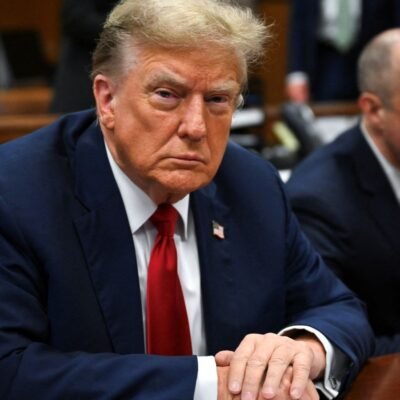CNN
—
A New York appeals court has denied Donald Trump’s petition to change the venue of his upcoming hush money trial.
The former president’s attorneys on Monday had urged the court to postpone the trial so it could consider whether to change the venue, arguing that Trump cannot get a fair jury in New York.
But Associate Justice Lizbeth González quickly denied the motion to stop the trial after hearing arguments Monday, and there is no further argument on the motion to change the venue.
Trump’s attorneys had filed the petition in the state appellate court earlier in the day, one week before his trial is set to begin.
Trump’s attorneys also said they are filing a petition objecting to the gag order imposed by Judge Juan Merchan barring Trump from publicly discussing witnesses in the upcoming trial, as well as staff and family of the court and district attorney’s office. That was not argued on Monday.
At Monday’s hearing before the appeals court, Trump attorney Emil Bove rehashed a survey and media study referenced in the former president’s previous motion submitted to Merchan to postpone based on pretrial publicity. The judge has not ruled on that motion.
“In terms of pretrial publicity in this county this case stands alone,” Bove said.
Jury selection cannot proceed next week in a fair manner in New York County, which is Manhattan, based on their research, Trump’s attorney claimed, reiterating his ask that the trial be delayed while their motion for a change of venue is resolved.
Manhattan District Attorney’s Office Chief of Appeals Steven Wu argued it was too late for Trump’s lawyers to make this petition this close to the start of the trial. He said the proper process is for Trump to renew a request for change of venue if it appears they cannot seat a fair jury from New York County in the jury selection process.
The question, Wu said, was not what Trump’s poll says, but whether jury selection can seat 12 impartial jurors and alternates.
“Defendant has assumed throughout this argument here that publicity here is inherently prejudicial. The facts do not bear this out,” Wu said. Wu said the articles for the most part are “even-handed coverage” of the case, summarizing the allegations. He argued that a case of this kind attracts international attention.
Nothing in Trump’s filings suggests New York County is uniquely saturated with media coverage or that New Yorkers in the county are uniquely incapable of being fair, Wu argued.
“The mere fact that jurors know about this case is not an indication of bias,” Wu said. “This is the defendant coming into this argument with unclean hands, because the publicity in large part is his own.”
The jury questionnaire for the hush money trial was also released Monday. Potential jurors will be asked a wide range of questions – from where in the city they live, to where they get their news, to whether they’ve ever attended a rally for the former president or had any affiliations with groups like the Proud Boys or with the QAnon movement.
Prospective jurors will be quizzed on their feelings about Trump and asked if they or anyone in their circle have ever been to a Trump rally or worked or volunteered for a Trump presidential campaign, the Trump presidential administration, or any other political entity affiliated with Trump. They’ll also be asked if they’ve ever participated in any anti-Trump groups or event. But they won’t be asked explicitly what political party they belong to, who they’ve voted for or who they have made political contributions to.
In addition to their news consumption, jurors will be asked whether they’ve ever read or listened to any books or podcasts by Michael Cohen, Trump’s former lawyer and a central witness in the case against him, or former Manhattan prosecutor Mark Pomerantz who also wrote a book about this case.
Jury selection is set to begin in the hush money trial on April 15.
This headline and story have been updated with additional developments.





